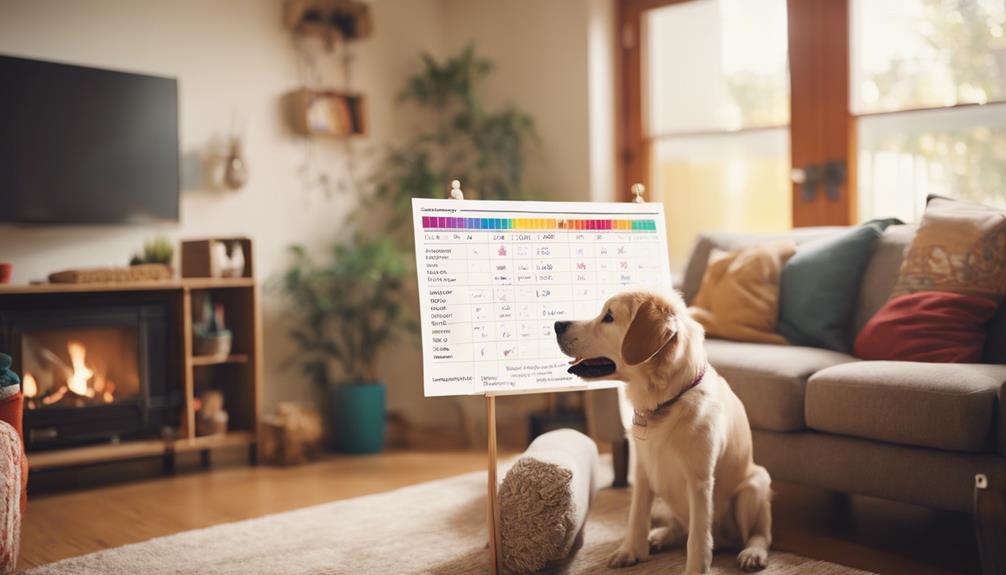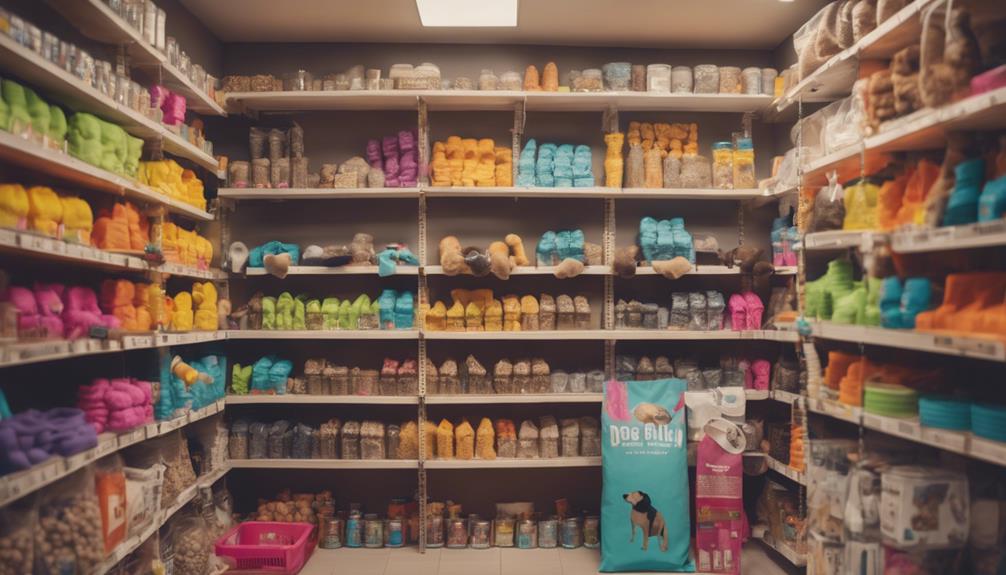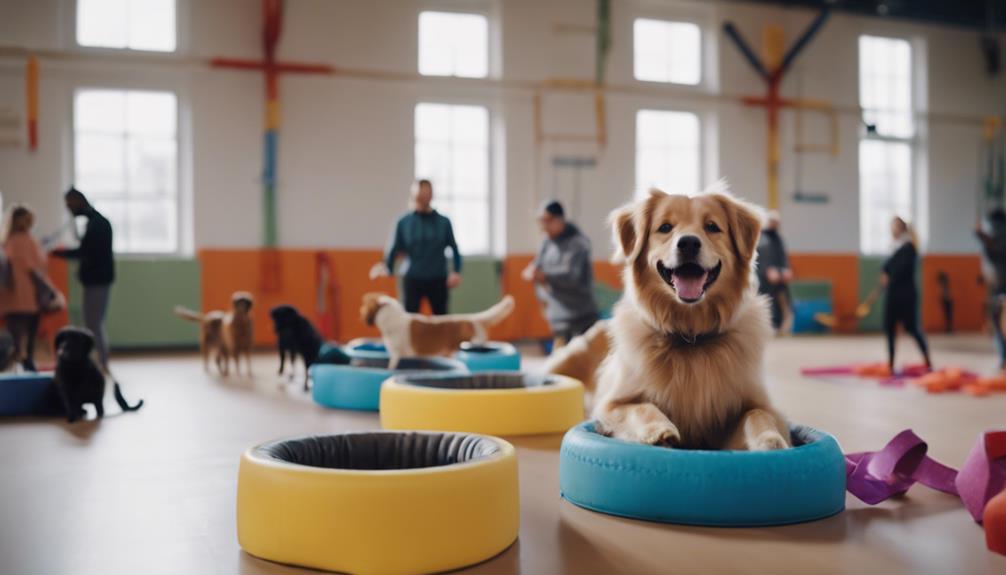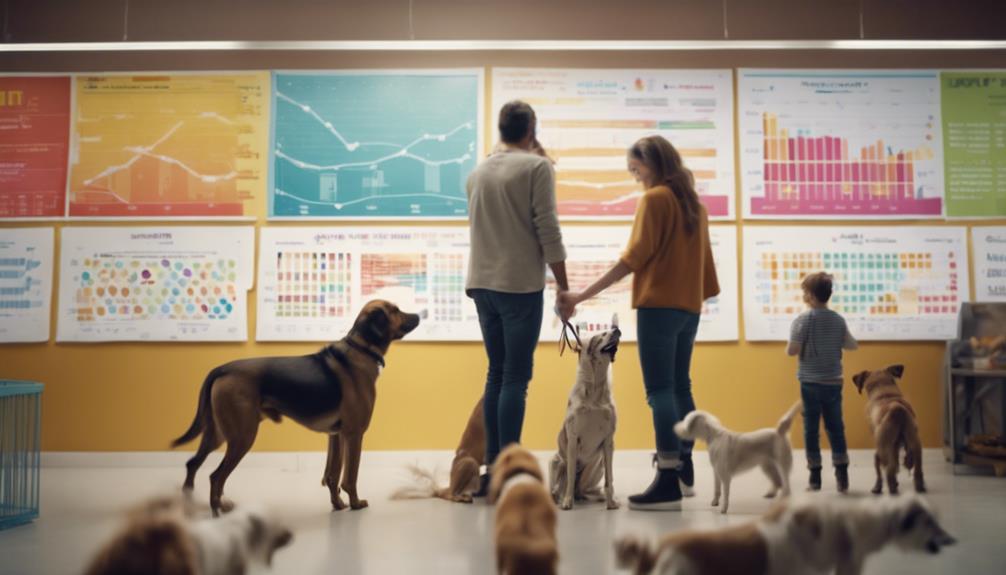Adopting a dog is a rewarding endeavor, yet it is essential to understand the associated financial responsibilities. Adoption fees typically range from $50 to $300, which may cover initial health screenings and assessments. However, this is just the beginning; prospective owners must also consider initial medical expenses, essential supplies, and ongoing care costs that can significantly impact their budget. While some costs are predictable, others may arise unexpectedly, leading to further financial implications. Understanding the complete financial landscape is crucial for those considering this commitment. What other costs might surprise you along the way?
Adoption Fees Overview

Adoption fees for dogs typically range from $50 to $300, depending on the organization, the dog's age, and any included services such as vaccinations or spaying/neutering.
These fees are an important aspect of the adoption process, as they help cover costs associated with caring for the animals.
Organizations often assess pet temperament to match dogs with suitable families, ensuring a harmonious relationship between the pet and its new owners.
The adoption fee may also include initial health checks, which can be beneficial for first-time dog owners.
Understanding these fees allows potential adopters to budget effectively, ensuring they can provide a loving and stable environment for their new companion.
Initial Medical Expenses
Following the payment of adoption fees, new dog owners should anticipate additional initial medical expenses that are vital for ensuring their pet's health and well-being. These costs typically include the following:
- Initial check-ups: A veterinarian will conduct a thorough examination to assess your dog's overall health and identify any potential issues.
- Vaccination requirements: Essential vaccinations, such as rabies and distemper, are necessary to protect your dog from common diseases.
- Preventative treatments: This may include treatments for parasites like fleas, ticks, and heartworms, which are crucial for your dog's long-term health.
Investing in these initial medical expenses not only ensures compliance with health regulations but also fosters a strong foundation for a happy, healthy life for your newly adopted dog.
Supplies and Equipment Costs

New dog owners should budget for essential supplies and equipment, as these items are crucial for creating a safe and comfortable environment for their new pet.
Key expenses include dog bed options, which vary from basic mats to orthopedic styles designed for older dogs. Selecting the right bed can significantly impact your dog's comfort.
Additionally, leash types are important; options include standard leashes, retractable leashes, and harnesses. Each type serves a purpose and influences how you control your dog during walks.
Other necessary supplies may include food and water bowls, toys, grooming tools, and a crate or carrier.
Ongoing Care and Maintenance
When adopting a dog, ongoing care and maintenance are essential for ensuring your pet's health and happiness.
This includes expenses for food and nutrition, regular veterinary visits, and grooming and hygiene needs.
Understanding these costs is crucial for responsible pet ownership, as they contribute significantly to the overall financial commitment of having a dog.
Food and Nutrition Expenses
Consistently providing high-quality food and nutrition is essential for the ongoing health and well-being of your dog. Proper nutrition not only supports their physical health but also impacts their behavior and energy levels.
Here are three key components to consider in your dog's diet:
- Commercial Dog Food: Choose a high-quality brand that meets your dog's specific needs.
- Homemade Meals: Prepare balanced meals using dog-safe ingredients, ensuring they receive essential nutrients.
- Nutritional Supplements: Incorporate supplements if necessary, to fill any gaps in their diet.
Budgeting for food and nutrition expenses is critical, as these costs can vary significantly based on the size and dietary needs of your dog. Investing in quality nutrition will help maintain their health for years to come.
Regular Veterinary Visits
Regular veterinary visits are essential for ensuring the ongoing health and well-being of your dog, as they provide necessary vaccinations, preventive care, and early detection of potential health issues.
These visits typically include wellness exams, which allow veterinarians to assess your dog's overall health and catch any problems before they become serious.
Preventive care measures often involve vaccinations against common diseases, flea and tick prevention, and heartworm testing. Regular check-ups can help identify weight issues, dental problems, or skin conditions, ensuring your dog remains healthy and happy.
The cost of these visits can vary, but budgeting for routine veterinary care is crucial. Investing in regular veterinary visits ultimately contributes to your dog's long-term health and can save you money on more serious treatments in the future.
Grooming and Hygiene Needs
Grooming and hygiene are vital components of your dog's ongoing care, as they contribute not only to physical health but also to overall well-being and comfort.
Regular grooming and effective hygiene routines help prevent health issues and keep your dog happy.
Here are three essential grooming products to consider:
- Brushes – Regular brushing removes loose fur and prevents matting, especially in long-haired breeds.
- Shampoo – A gentle, dog-specific shampoo helps maintain a clean coat and skin without causing irritation.
- Nail Clippers – Keeping your dog's nails trimmed is crucial for their mobility and comfort.
Establishing consistent hygiene routines will enhance your dog's quality of life while minimizing the risk of health complications.
Training and Socialization Expenses

Training and socialization expenses are essential investments that contribute significantly to a dog's well-being and behavior, ensuring a harmonious integration into the household and community.
Enrolling in obedience classes is a fundamental step in teaching your dog basic commands and good manners. These classes typically range from $100 to $300 for a series of sessions, depending on location and instructor expertise.
Alongside obedience training, employing effective socialization techniques helps dogs become comfortable around various people and other animals. This can include puppy playgroups, which often cost around $20 to $50 per session.
Unexpected Costs to Consider
When adopting a dog, it is important to be aware of unexpected costs that may arise.
Emergency veterinary expenses can occur unexpectedly due to accidents or illnesses, and these costs can be significant.
Additionally, ongoing training and socialization expenses might be necessary to ensure your dog develops good behavior and skills, which can also add to the overall financial commitment of dog ownership.
Emergency Veterinary Expenses
Emergency veterinary expenses can arise unexpectedly, often leading to significant financial strain for dog owners. To be prepared, consider these potential costs as part of your emergency preparedness plan:
- Accidental Injuries: Dogs can get into accidents, requiring immediate care or surgery.
- Sudden Illnesses: Conditions like infections or poisoning can necessitate urgent veterinary visits and treatments.
- Chronic Conditions: Some dogs may develop health issues that require ongoing emergency care, adding to expenses.
Investing in pet insurance can help mitigate these costs, providing financial support during emergencies.
Understanding these potential expenses is crucial for responsible dog ownership, ensuring you are ready for any situation that may arise.
Training and Socialization Costs
Investing in proper training and socialization for your dog is essential, but it can also lead to unexpected costs that new pet owners may overlook.
Puppy classes are a common expense, often costing between $100 to $300 for a series of sessions. These classes teach basic commands and effective socialization techniques.
Additionally, you may need to invest in ongoing training sessions or private lessons if your dog requires extra help, which can add another $50 to $150 per session.
Don't forget about the costs associated with socialization outings, such as trips to dog parks or pet-friendly events, which can incur transportation or entry fees.
Planning for these expenses ensures your dog receives the best start in life.

